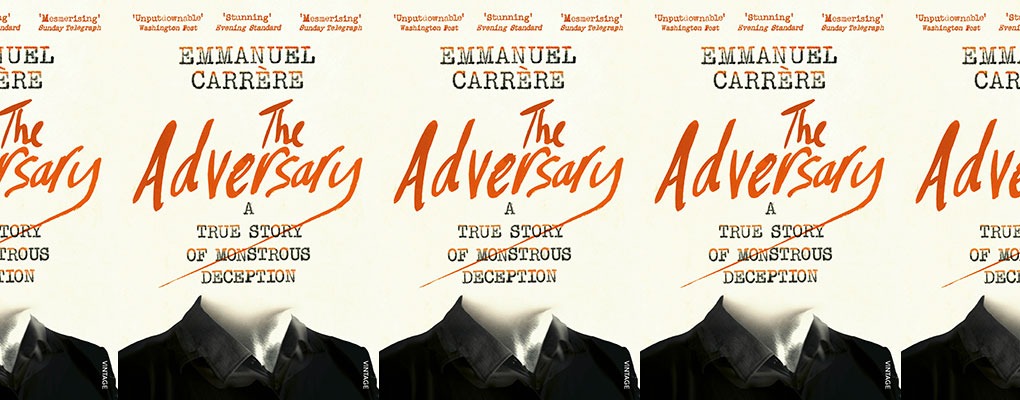Books
Extract: The Adversary by Emmanuel Carrère
The Adversary is a true story of monstrous deception from one of France’s greatest living writers, Emmanuel Carrère. This chilling tale is currently Waterstones’ non-fiction book of the month – and with good reason.
“On the Saturday morning of January 9, 1993, while Jean Claude Romand was killing his wife and children, I was with mine in a parent-teacher meeting…”
With these chilling first words, acclaimed master of psychological suspense, Emmanuel Carrère, begins his exploration of the double life of a respectable doctor, eighteen years of lies, five murders, and the extremes to which ordinary people can go.
Read on for an extract from The Adversary!
The Adversary
by
Emmanuel Carrère
On the Saturday morning of January 9, 1993, while Jean Claude Romand was killing his wife and children, I was with mine in a parent-teacher meeting at the school attended by Gabriel, our eldest son. He was five years old, the same age as Antoine Romand. Then we went to have lunch with my parents, as Jean-Claude Romand did with his, whom he killed after their meal. I usually devote Saturday afternoons and Sundays to my family, but I spent the rest of that week end alone in my studio because I was finishing up a book I had been working on for over a year, a biography of the science fiction writer Philip K. Dick. The last chapter described the days he spent in a coma before his death. I completed it on Tuesday evening and on Wednesday morning opened my newspaper to the lead article on the Romand case.
Luc Ladmiral was awakened shortly after four o’clock Monday morning by a telephone call from Jacques Cottin, the pharmacist in Prevessin. The Romands’ house was on fire; their friends should come try to salvage as much of the furniture as possible. When Luc arrived, the firemen were bringing our the bodies. All his life he will remember the sealed gray plastic bags into which they had put the children: too horrible to look at. Florence had simply been covered with a coat. Her face, blackened by the smoke, was unmarked. Smoothing her hair in a desolate gesture of fare well, Luc’s fingers encountered something strange. He felt around, carefully tilting the young woman’s head to one side, then called over a fireman to show him, at the base of the skull, an open wound. It must have been from a beam that fell on her, the fireman said; part of the attic had collapsed. Luc then clambered into the red truck where the rescuers had placed Jean-Claude, the only one of the family who was still alive. His pulse was weak. He was in pajamas, unconscious, burned yet already as cold as a corpse.
An ambulance arrived and took him away to the closest major hospital, across the border in Geneva. It was dark, chilly, and the jets of water from the fire hoses had drenched everyone. Since there was nothing more to be done at the scene, Luc went to the Cottins’ house to dry off. In the yellow light of the kitchen, they listened to the sputtering of the coffee pot, not daring to look at one another. Their hands shook when they raised their cups, and as they stirred their coffee, the spoons made a dreadful racket. Then Luc went home to tell Cecile and the children what had happened. Sophie, their eldest, was Jean-Claude’s god daughter. A few days earlier, as she often did, she had slept over at the Romands’ house, and she might very well have slept there again that night and wound up, like her playmates, in a grey plastic bag.
They had been friends ever since medical school in Lyon. They’d gotten married almost at the same time; their children had grown up together. Each knew everything about the other’s life-the public image, but also the secrets, the secrets of honest, reliable men who were all the more vulnerable to temptation. When Jean-Claude had confided in him about an affair, talked about chucking every thing, Luc had made him listen to reason: “And you’ll do the same for me, when it’s my turn to be an ass.” A friend ship like that is one of the precious things in life, almost as precious as a successful marriage, and Luc had always been certain that one day, when they were sixty or seventy years old, they would look back together as from a mountaintop, after all that time, on the road they had traveled: the places where they’d stumbled, almost gotten lost; the ways they’d helped each other, and how, in the end, they’d come through everything. A friend, a true friend, is also a witness, someone whose attention affords you a clearer look at your own life, and for twenty years each of them had unfailingly, without any fuss, played this role for the other. Their lives were very similar, even if they hadn’t succeeded in the same way. Jean Claude had become a leading figure in the world of research, hobnobbing with government ministers, always off at inter national conferences, while Luc was a general practitioner in Ferney-Voltaire. But Luc wasn’t jealous. The only thing that had come between them was an absurd disagreement, during the last few months, regarding their children’s school. For some unfathomable reason, Jean-Claude had really got ten on his high horse, so Luc had had to take the first step, saying that they weren’t going to quarrel over such a silly thing. The whole business had upset Luc; he and Cecile had talked it over several evenings in a row. How trivial it seemed now! How fragile life is! Only yesterday, there was a close, happy family, people who loved one another, and today-a boiler accident, charred bodies being taken to the morgue… His wife and children were everything to Jean Claude. What would his life be like if he survived?
Luc phoned the emergency room in Geneva: the patient had been placed in a hyperbaric oxygen chamber; the prognosis was guarded.
Luc prayed with Cecile and the children that he would never regain consciousness.


Please note: Moderation is enabled and may delay your comment being posted. There is no need to resubmit your comment. By posting a comment you are agreeing to the website Terms of Use.